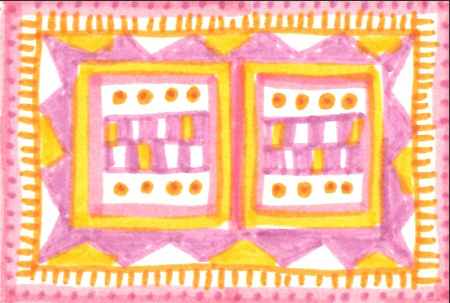| MONO, POLY, WHATEVER
Overview
----------------------------------------------------------------------
A rambled musing on relationships. Mildly coherent.
The core
---------------------------------------------------------------------- |
| 
|
|
In my core I believe people are good and well intended. Maybe I don't
always see that goodness in people, but it's what I believe. I like
this belief because it lets me approach the world in an open and
positive manner. I also believe that people want to make connections
in the world, and that these connections happen in many different
ways. We make connections that are friendly, romantic, sexual,
platonic, and/or intellectual. Often, these connections are turned
into a framework: best friend, lover, partner, mentor, and so on.
Getting hurt
---------------------------------------------------------------------- |
| 
|
|
Hurt is inevitable in any connection. Anyone can hurt me. A friend can
do it just as well as a partner. I don't like getting hurt. Being
dumped hurts, and it hurts to try to understand why I was dumped, and
why someone wants to be with someone else, and why someone doesn't
have the same love for me as I do for them. Fundamentally, I want
people to be with the people they want to be with. So fundamentally
I'm actually OK if a (ex)partner wants to be with someone else in a
different capacity. If either I can't understand or can't accept their
reasons, all I can do is accept this fact. And all I can do is be
happy for them for their new path and, if agreeable, and find a new
way to carry down our own path together (how long does it take for
ex-lovers to become best friends?)
Collision
---------------------------------------------------------------------- |
| 
|
|
All of these thoughts and feelings and beliefs for me collide into a
single concept: commitment. For me, what the relationship is called is
secondary to how it breathes; for me, it should breathe with
commitment. A commitment to be open, to be emotionally present, to
work through conflict, to love and show kindness, and to create, agree
upon, and respect each other's boundaries. The qualities of commitment
are important in any and every relationship, and they're truly always
present in the relationships that survive. For me, really and finally,
this is all that matters. And it's from here that I find strength to
create many types of new relationships.
Common carry
---------------------------------------------------------------------- |
| 
|
|
Unfortunately, starting new relationships is difficult. I come into a
relationship along my unique trajectory with my particular satchel of
experience. As I lay the particulate before me and in front of a new
boo, there may be particles that appear to them unfamiliar,
threatening, or frightening. Hopefully, too, some particles appear
exciting, enticing, and loving. Commitment figures its way into a
budding romance just as it defines a long lasting union. From the
start there is a commitment to be together openly on new ground,
examining new behaviours, reactions, reflections and challenges. What
particle from my satchel will I add to our common carry? What will
they add? If two particles are incompatible can we get along with our
journey all the same?
Frameworks
---------------------------------------------------------------------- |
| 
|
|
Relationships end. They always do. It could be death, or something
more exacting but diffuse like a growing distance, a new interest, or
a breach of trust. The constant is that one way or another they'll be
over. But that's not a bad outcome, it's not something to avoid. For
me, finding a framework that allows me to move through the changing
features of a relationship in a positive way is most important. It's
corny, but I do believe that /all endings are also new
beginnings/. It's difficult to stomach the hurt that results from a
framework disruption. For a while, the feelings may be inverse to how
the relationship began. Not happy, but sad. Not elated, but
defeated. Not hopeful, but despondent. Is this inevitable? Maybe.
What I want
---------------------------------------------------------------------- |
| 
|
|
I want to love the people in my life. I want to be emotionally and
physically available to these people--my loved ones--in ways that are
appropriate, honest, and reciprocle. I want to feel my feelings freely
and act on them responsibly. I want to be surrounded by people who are
not threatened by what they don't understand. I may not be able to
explain what brings me joy and pleasure, fulfilment and
connection. And I want that to be OK. All the same, I want to
participate as active player eager hearer of what brings my loved ones
their own sense of love. I imagine these wants like a dinner with many
people gathered around. Each person at the table representing a
different part of myself: the part that grows and learns, the part
that laughs and cries, the part that desires and endeavors, the part
that touches and is touched. My loved ones bring these parts out of
me. /They are these parts of me/. And I'd never want to find myself
seated at a table without one more seat, one more meal, for that part
of myself who has yet to arrive and has yet to be loved.
Love
---------------------------------------------------------------------- |
| 
|
|
I've been through frameworks of monogamy and polyamory. I've become
frustred by not being understood by monogamists who can't grasp
polyamory, and polyamorists who can't grasp monogamy (I've also been
that stubborn monogamist, and I've been that stubbord polyamorist.)
Returning to fundamentals, I believe the /existence of love/ is what's
important, not /what that love is called/. The framework--monogamy,
polyamory--is simply the protective shell that's used to insulate its
inhabitants from getting hurt, which is ironic because that hurt
usually happens from the inside-out, not the outside-in. All of this
leaves me feeling that whatever I call the relationship doesn't really
matter. I've called it a friendship, partnership, cohabitation,
whatever. Mostly, though, I've always found myself just wanting to
call it love. |






